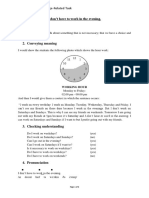0 ratings0% found this document useful (0 votes)
399 viewsThe Career Ladder - Exercises PDF
The Career Ladder - Exercises PDF
Uploaded by
Juan Esteban S. MéndezCopyright:
© All Rights Reserved
Available Formats
Download as PDF or read online from Scribd
The Career Ladder - Exercises PDF
The Career Ladder - Exercises PDF
Uploaded by
Juan Esteban S. Méndez0 ratings0% found this document useful (0 votes)
399 views2 pagesOriginal Title
The Career Ladder - Exercises.pdf
Copyright
© © All Rights Reserved
Available Formats
PDF or read online from Scribd
Share this document
Did you find this document useful?
Is this content inappropriate?
Copyright:
© All Rights Reserved
Available Formats
Download as PDF or read online from Scribd
Download as pdf
0 ratings0% found this document useful (0 votes)
399 views2 pagesThe Career Ladder - Exercises PDF
The Career Ladder - Exercises PDF
Uploaded by
Juan Esteban S. MéndezCopyright:
© All Rights Reserved
Available Formats
Download as PDF or read online from Scribd
Download as pdf
You are on page 1of 2
65
134
The career ladder
Getting a job
When Paul left school he applied for (= wrote an official request for) a job in the accounts
department of a local engineering company. They gave him a job as a trainee (= a very
junior person in a company). He didn’t earn very much but they gave him a lot of training
(= organised help and advice with learning the job), and sent him on training courses.
Note: Training is an uncountable noun, so you cannot say ‘a training’. You can only talk
about training (in general), or a training course (if you want to refer to just one). Here you
can use the verbs do or go on: I did / went on several training courses last year,
Moving up
Paul worked hard at the company and his prospects (= future possibilities in the job) looked
good. After his first year he got a good pay rise (= more money), and after two years he was
promoted (= given a higher position with more money and responsibility). After six yeatshe
was in charge of (= responsible for / the boss of) the accounts department with five other
employees (= workers in the company) under him (= under his responsibility/authority)
Leaving the company
By the time Paul was 30, however, he decided he wanted a fresh challenge (= a new exciting
situation). He was keen to work abroad, so he resigned from his company (= officially told
the company he was leaving his jobs you can also say ‘he quit the company’) and started
looking for a new job with a bigger company. After a couple of months he managed to find
a job with an international company which involved (= included) a lot of foreign travel. He
was very excited about the new job and at first he really enjoyed the travelling, but ...
Hard times
After about six months, Paul started to dislike the
constant moving around, and after a year he hated it;
he hated living in hotels, and he never really made
any friends in the new company. Unfortunately his
work was not satisfactory either and finally he was
sacked (= told to leave the company / dismissed /
given the sack) a year later.
After that, Paul found things much more difficult. He
was unemployed (= out of work / without a job) for
over a year. He had to sell his car and move out of
his new house. Things were looking bad and in the
end Paul had to accept a part-time job (= working
only some of the day or some of the week) on a fruit
and vegetable stall in a market.
Happier times
To his surprise, Paul loved the market. He made lots of friends and enjoyed working out in
the open air. After two years, he took over (= took control of) the stall. Two years later he
opened a second stall, and after ten years he had fifteen stalls, Last year Paul retired (=
stopped working completely) at the age of 55, a very rich man.
English Vocabulary in Use (presintermediate & intermediate)
65.1
65.2
65.3
65.4
65.5
Exercises
Write a single word synonym for each of these words/phrases.
1 given the sack =
2 our of work =
3 left the company =
4. was given a better position in the company =
5. future possibilities in a job =
6 stopped working for ever
7 workers in a compan
Find the logical answer on the right for each of the questions on the left.
1 Why did they sack him? a Because he was nearly 65.
2. Why did they promote him? b Because he was late for work every day.
3. Why did he apply for the job? ¢ Because he needed more training,
4 Why did he retire? d Because he was out of work.
S Why did he resign? € Because he was the best person in the department.
6 Why did he go on the course? f Because he didn’t like his boss.
Complete these sentences with a suitable word or phrase.
I don’t want a full-time job. I'd prefer to work
She'd like to go on another training
I'm bored in my job. I need a fresh
He works on a stall in the
At the end of this year we should get a good pay
She’s got more than a hundred workers under :
I didn’t know he was the new manager. When did he take ?
It’s a boring job and the pay is awful. Why did he >
eA Ree
Complete this word-building table. Use a dictionary to help you.
Verb General noun Personal noun(s)
promote :
employ
resign :
retire -
train
Have you got a job in a company? If so, answer these questions as quickly as you can,
What does your job involve?
Are you responsible for anything or anyone?
Have you had much training from the company?
Have the company sent you on any training courses?
Have you been promoted since you started in the company?
Do you normally get a good pay rise at the end of each year?
How do you feel about your future prospects in the company?
Are you happy in the job or do you feel itis time for a fresh challenge in another
company?
eA Ree
If possible, ask another person the same questions.
English Vocabulary in Use (presintermediate & intermediate) 135
You might also like
- The Subtle Art of Not Giving a F*ck: A Counterintuitive Approach to Living a Good LifeFrom EverandThe Subtle Art of Not Giving a F*ck: A Counterintuitive Approach to Living a Good LifeRating: 4 out of 5 stars4/5 (5891)
- The Gifts of Imperfection: Let Go of Who You Think You're Supposed to Be and Embrace Who You AreFrom EverandThe Gifts of Imperfection: Let Go of Who You Think You're Supposed to Be and Embrace Who You AreRating: 4 out of 5 stars4/5 (1103)
- Never Split the Difference: Negotiating As If Your Life Depended On ItFrom EverandNever Split the Difference: Negotiating As If Your Life Depended On ItRating: 4.5 out of 5 stars4.5/5 (870)
- Grit: The Power of Passion and PerseveranceFrom EverandGrit: The Power of Passion and PerseveranceRating: 4 out of 5 stars4/5 (597)
- Hidden Figures: The American Dream and the Untold Story of the Black Women Mathematicians Who Helped Win the Space RaceFrom EverandHidden Figures: The American Dream and the Untold Story of the Black Women Mathematicians Who Helped Win the Space RaceRating: 4 out of 5 stars4/5 (912)
- Shoe Dog: A Memoir by the Creator of NikeFrom EverandShoe Dog: A Memoir by the Creator of NikeRating: 4.5 out of 5 stars4.5/5 (543)
- The Hard Thing About Hard Things: Building a Business When There Are No Easy AnswersFrom EverandThe Hard Thing About Hard Things: Building a Business When There Are No Easy AnswersRating: 4.5 out of 5 stars4.5/5 (352)
- Elon Musk: Tesla, SpaceX, and the Quest for a Fantastic FutureFrom EverandElon Musk: Tesla, SpaceX, and the Quest for a Fantastic FutureRating: 4.5 out of 5 stars4.5/5 (474)
- Her Body and Other Parties: StoriesFrom EverandHer Body and Other Parties: StoriesRating: 4 out of 5 stars4/5 (830)
- The Sympathizer: A Novel (Pulitzer Prize for Fiction)From EverandThe Sympathizer: A Novel (Pulitzer Prize for Fiction)Rating: 4.5 out of 5 stars4.5/5 (122)
- The Little Book of Hygge: Danish Secrets to Happy LivingFrom EverandThe Little Book of Hygge: Danish Secrets to Happy LivingRating: 3.5 out of 5 stars3.5/5 (414)
- The Emperor of All Maladies: A Biography of CancerFrom EverandThe Emperor of All Maladies: A Biography of CancerRating: 4.5 out of 5 stars4.5/5 (272)
- The Yellow House: A Memoir (2019 National Book Award Winner)From EverandThe Yellow House: A Memoir (2019 National Book Award Winner)Rating: 4 out of 5 stars4/5 (99)
- The World Is Flat 3.0: A Brief History of the Twenty-first CenturyFrom EverandThe World Is Flat 3.0: A Brief History of the Twenty-first CenturyRating: 3.5 out of 5 stars3.5/5 (2270)
- Devil in the Grove: Thurgood Marshall, the Groveland Boys, and the Dawn of a New AmericaFrom EverandDevil in the Grove: Thurgood Marshall, the Groveland Boys, and the Dawn of a New AmericaRating: 4.5 out of 5 stars4.5/5 (269)
- Team of Rivals: The Political Genius of Abraham LincolnFrom EverandTeam of Rivals: The Political Genius of Abraham LincolnRating: 4.5 out of 5 stars4.5/5 (235)
- A Heartbreaking Work Of Staggering Genius: A Memoir Based on a True StoryFrom EverandA Heartbreaking Work Of Staggering Genius: A Memoir Based on a True StoryRating: 3.5 out of 5 stars3.5/5 (232)
- On Fire: The (Burning) Case for a Green New DealFrom EverandOn Fire: The (Burning) Case for a Green New DealRating: 4 out of 5 stars4/5 (74)
- 248 How To Improve Your Singing Voice - How To Train Your VoiceDocument5 pages248 How To Improve Your Singing Voice - How To Train Your VoiceJuan Esteban S. Méndez100% (1)
- I - 26b Verbs-Followed-By-InfinitiveDocument2 pagesI - 26b Verbs-Followed-By-InfinitiveItzel PerezNo ratings yet
- The Unwinding: An Inner History of the New AmericaFrom EverandThe Unwinding: An Inner History of the New AmericaRating: 4 out of 5 stars4/5 (45)
- A. Some of These Phrases Are Used Formally and Some Informally. Tick The Correct Column. A B C D e F GDocument1 pageA. Some of These Phrases Are Used Formally and Some Informally. Tick The Correct Column. A B C D e F GJuan Esteban S. MéndezNo ratings yet
- CELTA Assignment 2 Language Related Task PDFDocument8 pagesCELTA Assignment 2 Language Related Task PDFJuan Esteban S. MéndezNo ratings yet
- Singing and Vocal Development: June 2006Document27 pagesSinging and Vocal Development: June 2006Juan Esteban S. Méndez100% (1)
- What Does It Take To Teach Online?: January 2006Document15 pagesWhat Does It Take To Teach Online?: January 2006Juan Esteban S. MéndezNo ratings yet
- For and SinceDocument2 pagesFor and SinceJuan Esteban S. MéndezNo ratings yet
- Singing Techniques - How To Strengthen Your Singing VoiceDocument5 pagesSinging Techniques - How To Strengthen Your Singing VoiceJuan Esteban S. MéndezNo ratings yet
- Ja Yearly Horoscope Analysis w19.036.242 1Document47 pagesJa Yearly Horoscope Analysis w19.036.242 1Juan Esteban S. MéndezNo ratings yet
- Talking About Jobs PDFDocument5 pagesTalking About Jobs PDFJuan Esteban S. MéndezNo ratings yet
- ArabicDocument142 pagesArabicSue Melehani100% (4)
- Introduction To AstrologyDocument23 pagesIntroduction To AstrologyJuan Esteban S. MéndezNo ratings yet




















































